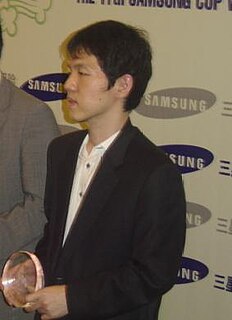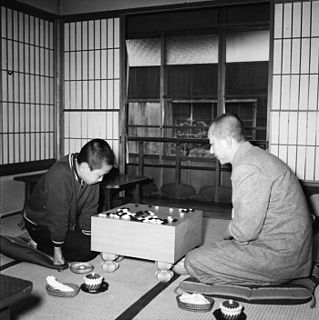
Go is an abstract strategy board game for two players in which the aim is to surround more territory than the opponent. The game was invented in China more than 2,500 years ago and is believed to be the oldest board game continuously played to the present day. A 2016 survey by the International Go Federation's 75 member nations found that there are over 46 million people worldwide who know how to play Go and over 20 million current players, the majority of whom live in East Asia.

A Go professional is a professional player of the game of Go. The minimum standard to acquire a professional diploma through one of the major Go organisations is very high. The competition is tremendous, and prize incentives for champion players are very large. For example, the Honinbo Tournament has a grand prize of about $350,000.

Lee Chang-ho is a South Korean professional Go player of 9-dan rank. He is regarded by many as the best Go player of the late 1990s and early 2000s. He was a student of Cho Hun-hyun 9-dan. He is the second youngest to become a professional Go player in South Korean history behind Cho Hun-hyun. He is the only player to have won all eight international competitions at least once.

Cho Hunhyun is a South Korean 9-dan professional Go player. Considered one of the greatest players of all-time, Cho reached professional level in Korea in 1962. Since then, Cho has amassed 150 professional titles, more than any player in the world. He thrice held all of the open tournaments in Korea in 1980, 1982 and 1986. Cho has also won 11 international titles, third most in the world behind Lee Chang-ho (21) and Lee Sedol (18). He reached 1,000 career wins in 1995.

In the history of go in Japan, the four go houses were four major schools of go instituted, supported, and controlled by the state, at the beginning of the Tokugawa shogunate. At roughly the same time shogi was organised into three houses. Here "house" implies institution run on the recognised lines of the iemoto system common in all Japanese traditional arts. In particular the house head had, in three of the four cases, a name handed down: Inoue Inseki, Yasui Senkaku, Hayashi Monnyu. References to these names therefore mean to the contemporary head of house.

Cho Chikun25th HoninboHonorary Meijin is a professional South Korean Go player and a nephew of Cho Namchul. His total title tally of 75 titles is the most in the history of the Japanese Nihon Ki-in. Cho is the first player to hold the top three titles—Kisei, Meijin, and Honinbo—simultaneously which he did for three years in a row. Cho is the first in history to win all of the "Top 7" titles in Japan which he achieved by winning the Oza in 1994. Cho U in 2011 and Iyama Yuta in 2013 would duplicate this feat, both by winning the Kisei. He is also one of the 'Six Supers' Japanese players that were most celebrated in the late twentieth century, along with Rin Kaiho, Otake Hideo, Takemiya Masaki, Kato Masao and his classmate and arch-rival Kobayashi Koichi.

Rin Kaihō or Lin Haifeng is a professional Taiwanese Go player who made his name in Japan. He is, along with Cho Chikun, Kobayashi Koichi, Otake Hideo, Takemiya Masaki and Kato Masao, considered one of the 'Six Supers' that dominated Japanese Go world in the last three decades of the twentieth century.
Cho U is a Taiwanese professional Go player. He currently ranks 6th in the most titles won by a Japanese professional; his NEC Cup win in 2011 put him past his teacher Rin Kaiho and Norimoto Yoda. Cho is the first player in history to have held five of the top seven major titles simultaneously with Iyama Yuta being the second. Cho U, Naoki Hane, Keigo Yamashita and Shinji Takao make up the group of players in Japan called the "Four Heavenly Kings". His wife is one of Japan's best female go professionals, Izumi Kobayashi, the great Kitani's granddaughter and daughter of Kobayashi Koichi.
Yuta Iyama Kisei, Honinbo, Meijin is a Japanese professional Go player. In April 2016, he became the first player in Japanese history to hold all seven major titles simultaneously. In January 2018, Iyama became the first professional Go player to be awarded Japan's People's Honour Award.
Hideyuki Fujisawa, also known as Shuko Fujisawa, was a Japanese professional Go player. A younger uncle of another professional, Hosai Fujisawa and grandfather of professional Go player Hideyuki Fujisawa.
Koichi Kobayashi is a Japanese Go player. He is one of the 'Six Supers' who championed Japanese Go in the last three decades of Japanese Go.
Professional Go players in Japan are given the title of "Honorary" title holder if they hold a title for a straight five or more years. Below is a list of the honorary title holders and which title they are honored for.
Yoshio Ishida is a professional Go player.
Kim Shushun, also known as Kin Hidetoshi, Kim Shujun, or Kim Sujun, is a professional Go player.
Jimmy Cha, also known as Ch'a Min-su, is a South Korean professional go and avid poker player. He is also a black belt in martial arts and a talented classical pianist.
Cho Namchul was a professional Go player. He died of natural causes in Seoul at the age of 83.
The 11th LG Cup professional Go tournament was won by Zhou Junxun. It featured:
Takehisa Matsumoto is a professional go player.
The 24th Fujitsu Cup featured 32 players.
The 18th Agon Cup began on 21 April 2011-1 October 2011. Two Korean amateur players were invited to the preliminaries, with both qualifying. Ha Sungbong defeated professionals Yanigasawa Satoshi and Furuya Yutaka. Kim Sungjin defeated 25th Honinbo and Japan's top title holder Cho Chikun. He also defeated Kato Atsushi. In the main tournament, he was knocked out by Iyama Yuta Meijin in the first round. Iyama Yuta came out as the winner. He beat Yamashita Keigo at the final. The winner's prize was ¥10,000,000.





